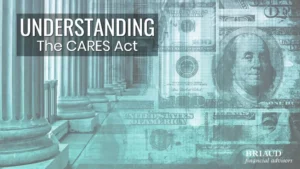Not only have we seen tremendous activity in markets across the world, but we have also seen lots of activity from Congress. Lawmakers passed the CARES Act (Coronavirus Aid, Relief, and Economic Security Act) in late March 2020 to help businesses and individuals deal with the economic impact of the pandemic, and they have been discussing the possibility of another stimulus bill. There is a lot covered in the CARES Act, so we thought we would review highlight items from the law that might impact our clients the most ahead of the three important deadlines coming in July and August.

Required Distributions
One of the most significant changes that impacts our clients is the waiver of all required distributions for 2020. No matter your age, you are not required to withdraw anything from your retirement accounts this year. Note, that as long as you are at least age 70 ½, you are still allowed to give to 501(c)(3) organizations directly from your retirement accounts (which is very beneficial!). And, will not have to pay taxes on these distributions. The only change is you are no longer required to take any distributions.
For those who took the required distribution earlier in the year, the IRS recently announced that you are allowed to put back the money into those same accounts, but you must do so before the Aug. 31, 2020 deadline. You can read more about this from the Wall Street Journal and CNBC.
One great benefit of not having to take required distributions (or putting them back in) is the possibility of completing Roth conversions. For those who do not need the distributions, this is a great time to withdraw funds from an IRA, pay taxes on that distribution, and then place the money into a Roth IRA, where you (and your heirs) will not pay taxes again (tax-free withdrawals on all earnings after age 59.5).
Tax Changes re: Charity
You now get a $300 charitable deduction above the line. So, even if you claim the standard deduction, you can give up to $300 directly to a qualified charity (not a Donor-Advised Fund) and still reap the benefit of an income tax deduction. For 2020, you are able to deduct charitable gifts equal to 100% of your adjusted gross income instead of the typical limits. Note that this is only for cash gifts and not for Donor-Advised Fund contributions (those contributions are still subject to the old limitations).
Tax Deadline Delays
Federal tax filing deadlines and estimated tax payment deadlines have been delayed. You now have until July 15, 2020. to file your 2019 tax return and pay your taxes. You also have until July 15 to make your first and second quarter estimated tax payments without any penalties. Please note that this is federal only. State deadlines vary.
Note, this delay also applies to IRA contributions; you have until July 15, 2020, to make 2019 IRA or Roth IRA contributions if you are eligible and have not already done so.
Taxpayer’s Recovery Rebate Advance
If you have not yet filed your 2019 taxes, you might consider whether or not you want to file them just yet. If your joint income was less than $150,000 (single less than $75,000) in 2018 or in 2019, if you have already filed, you may be receiving a check in the mail for $1,200 per person plus $500 per dependent child.
There are phase-outs above that income level, but if your 2018 income was low and your 2019 income high, you may want to delay filing until July 15. Note, if your income happens to be below these levels in 2020 (but were not in 2018 or 2019), you will still get a tax credit of these amounts in April of 2021. If you happen to have a great 2020, you will not have to give the rebate back.
Note, unemployment benefits have also been expanded as part of the CARES Act until July 31st. It now includes self-employed people (no employees), contract workers, etc., whose incomes have been affected. They are now eligible for benefits under Pandemic Unemployment Assistance.
Scams
With all of the direct assistance being given to individuals, there will be an increase in scams. Please be careful! If it doesn’t feel right, call us or forward us the email. Be very protective of your information and keep in mind, the government will never call you for your information or email you for your information. It is better to delete the email, hang up the phone call and force a legitimate person to call you back than to have to deal with the fallout from someone getting a hold of your personal information. Remember what we were taught as kids: If it sounds too good to be true, it usually is.
Small Businesses
If you own a small business that has been impacted by COVID-19, the CARES Act has several provisions that allow you to take out a loan to pay employees for 8 weeks and have that loan be forgiven if you maintain your payroll through June 30. Thankfully, our business has not been economically impacted by COVID-19, but we are very familiar with this loan program, so feel free to reach out if you would like further details. Some businesses have reported issues with applying, and the money has since run out. Congressional leaders are considering another round of funding to help small businesses.
There are also other loans available to small businesses that are not forgiven but have lower rates of interest because of our nation’s disaster declaration.
Need Additional Resources? We Can Help
This is only a snapshot of what is contained in the CARES Act. If you would like further resources, please let us know.
As a result of our rapidly changing environment, we highly encourage you to reach out to us and/or your CPA if you are looking to act on any of this information. Congress continues to pass new legislation and clarify existing legislation, so it is crucial to make sure you have the latest information before acting.

